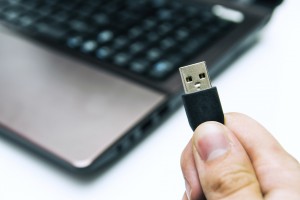 Angie from Neenah asks, “They say you need to eject your USB flash drive before removing it from the computer, and my computer scolds me when I don’t. Do I really have to eject first, or will it cause problems?”
Angie from Neenah asks, “They say you need to eject your USB flash drive before removing it from the computer, and my computer scolds me when I don’t. Do I really have to eject first, or will it cause problems?”
If you believe in “better safe than sorry,” you’ll eject your USB drives before pulling that plug. While different devices and different operating systems will produce different results, it’s typically not that difficult to eject a disk beforehand, so why not get in that habit for safety’s sake?
So what exactly is happening that makes certain operating systems like OS X get testy when you pull a USB drive before ejecting? To improve the performance of disks, the OS will do “write caching,” meaning when you write a file, it may not be immediately written. Have you ever ejected a disk and gotten a message saying the file was in use even though you thought you closed the program? Proof positive that sometimes, what looks like a completed write isn’t actually completed.
Windows will typically not do this caching to drives it deems “removable,” like USB flash drives. Larger drives will most likely employ write caching, so ejecting them is a good practice to avoid data corruption or file loss. It’s a good habit to get into, however, to do it to all USB drives. The two or three seconds it takes to eject is much less of an investment of time than having to try to recover a file or recreate lost work. (Be sure to back up your files regularly for an additional layer of protection!)
For more information on this topic or to talk to our of our trained computer pros about your tech needs, be sure to give us a call or contact us by e-mail. We’re always happy to help!
Do you have a tech question you’d like answered? Send it to Ask Flex Tech!
[contact-form-7 id=”538″ title=”Ask Flex Tech”]